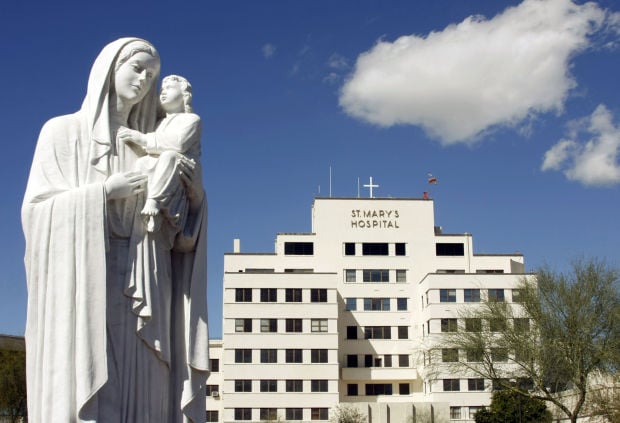A chain of Southern Arizona Catholic hospitals could soon be sold to two major health companies.
Dallas-based Tenet Healthcare Corp. and California-based Dignity Health have signed a letter of intent to own and operate the local Carondelet Health Network, network officials announced in a news release Tuesday.
Current Carondelet Health Network owners from Missouri-based Ascension would retain a minority interest in the chain of three Southern Arizona hospitals, the news release says. A period of due diligence will precede any definitive agreement, and that’s expected to take 90 days.
A spokesman from Ascension would not say whether the joint venture would be for profit or nonprofit. The news release says the agreement would maintain Carondelet’s identity, heritage and Catholic sponsorship.
Officials with the network — which consists of St. Mary’s and St. Joseph’s hospitals in Tucson and Holy Cross Hospital in Nogales — released a statement calling the purchase a “joint venture” of Missouri-based Ascension, Dignity and Tenet.
Company officials refused to disclose details of the pending agreement and declined further comment.
The Carondelet Health Network is Southern Arizona’s 14th-largest employer, according to the 2014 Arizona Daily Star ranking of the region’s 200 largest employers.
The network has a workforce of about 3,500 and is the second-largest local health system behind the University of Arizona Health Network, which operates two local hospitals.
The UA Health Network is in the midst of negotiating a sale to the nonprofit Phoenix-based Banner Health, which is one of the country’s largest health systems.
Both the Banner and the Tenet-Dignity deals would connect local hospitals with larger regional health systems, consistent with a national trend of consolidations, mergers and acquisitions in the hospital business.
For-profit Tenet is a publicly traded company and also one of the country’s largest health systems. Tenet officials declined comment Tuesday.
The company’s website says it operates hospitals in 14 states, including six in the Phoenix area: Arizona Heart Hospital in Phoenix; Arrowhead Hospital in Glendale; Maryvale Hospital in Phoenix; Paradise Valley Hospital in Phoenix; Phoenix Baptist Hospital in Phoenix; and West Valley Hospital in Goodyear.
The Carondelet Health Network’s local hospitals have endured serious operating losses in recent years.
The Catholic nonprofit’s hospitals — St. Mary’s, St. Joseph’s and Holy Cross — had losses in fiscal 2013 that totaled $32 million, Carondelet reported to the Arizona Department of Health Services. The previous fiscal year, the losses were a much worse $100 million.
Tenet would be the majority partner with management responsibility for all three of Carondelet’s Southern Arizona hospitals, the news statement says.
In a memo to employees and board members sent Tuesday, Carondelet Chief Executive Officer James K. Beckmann wrote that health care is changing, and “as such, we must evolve to meet community needs in a sustainable way and provide long-term stability for our associates and physician partners.”
Tenet would have management responsibility for the operations of all of Carondelet’s health system assets, including the Carondelet Medical Group and Carondelet Specialist Group, as well as all of Carondelet’s ancillary businesses, Beckmann wrote.
“We are excited to pursue this relationship with Tenet and Dignity Health. Like Carondelet, these organizations are committed to providing high-quality, low-cost, person-centered care,” Beckmann wrote.
“While you may have many questions right now, this is all of the detail that we can provide to you at this time. Much due diligence will be required by all parties over the next 90 days,” he continued.
In Arizona, Dignity Health already operates four Phoenix-area hospitals: Chandler Regional Medical Center, Mercy Gilbert Medical Center, St. Joseph’s Hospital and Medical Center, which includes Barrow Neurological Institute, and St. Joseph’s Westgate Hospital.
Dignity Health in Arizona also includes imaging centers, clinics, specialty hospitals, urgent-care centers, an insurance provider, an accountable care organization and other clinical partnerships.
Carondelet has a long history in the Tucson community.
The Sisters of St. Joseph of Carondelet opened St. Mary’s — Arizona’s first hospital — in 1880. St. Joseph’s opened in 1961, and the nuns began managing Holy Cross in 1981.
The company has shown recent signs of financial strain.
Carondelet bought 80 percent of the north-side Tucson Heart Hospital in 2006 and became 100 percent owner in 2010, when it changed the name to the Carondelet Heart and Vascular Institute. In 2012, Carondelet closed its stand-alone Heart and Vascular Institute and moved it to St. Mary’s Hospital.
Construction of the planned multimillion-dollar Carondelet Health & Wellness Pavilion in Sahuarita, about 15 miles south of Tucson, was to start earlier this year. But Sahuarita town officials were recently told the project would not go ahead on schedule.
The 14,000-square-foot clinic, which was to focus on primary care, would be built on property Carondelet had previously planned to use for a hospital. Those plans were shelved in the recession.
Last year the network laid off 40 people at its head office in Tucson. Officials said the layoffs were part of a staff restructuring in anticipation of the company’s 2014 fiscal year.





